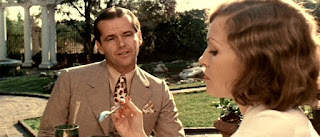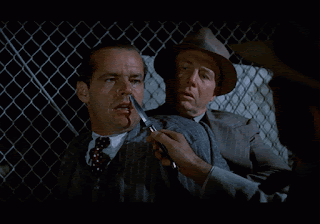This month has been interesting with showcasing this brand of films. I always feel of moment of reflection whenever I do these retrospectives since it really showcases how far a genre, or style has come. Now, this whole month hasn’t been chronologically accurate since I jumped around the movies that I was shown first. To me, I always like showing things with a new angle or just exposing people to movies that they’re completely unaware of. Having said all that, let’s wrap up my look into Noir with Chinatown.
1. Neo-Noir
Now when watching this film, you may be shocked to see that there’s technicolor. I can’t read minds, but I can at least guess that some people are glad that’s in color or just surprised. I feel that it’s intentional seeing how the Paramount logo starts in a brown sepia tone, then the movie begins with a spectrum of color. At least adjust the brightness when doing a marathon of noir films.
With this film, this is a representative of the sub-genre known as neo-noir. What that means is that it has the hallmarks of noir but places it in a contemporary style. Gone are the days where there’s witty banter in place of genuine cussing. There’s that in the movie. More so that there’s blood spilled and gun fights where it isn’t hastily telegraphed. This movie feels as genuine of a noir movie while being in full color.
One last thing is that I feel that this movie might be the first noir movie to have some historical significance. I’ll elaborate that further but just to pepper it in here. The film is loosely based on a water controversy that happened in Los Angeles in the 1930s. Which is when the film takes place. It wouldn’t be the last noir film to tackle, since I already talked about it with my review of Who Framed Roger Rabbit?
So, we follow the private investigator Jake as he gets a call to investigate a cheating husband. What turns from a standard surveillance morph into a grand scheme of corruption involving real estate. I always maintain that the best antagonist plan doesn’t involve taking over the world or snapping half of life out of existence. Instead, it’s exploiting land for real estate purposes with water.
This movie has a lot going for it since we see how much Jake evolves from a usual private investigator to someone who’s trying to save a life. As we see throughout the movie, Jake takes matters into his own hands by seeing and dealing with the aftermath of water that is dried out and pumped in. He manages to climb his way into a closed area, while also being harmed in the process.
In one way, I feel that this movie does show more with what the protagonist does to further get entangled in a web of deceit. I like the moments where he snoops around and even sell his way into a retirement home just to get some info. Jake is the one who can’t be bought or turn the other way.
Which is saying a lot for the supporting cast of the movie. Evelyn is a perfect fit for Jake since she manages to be shady and slowly reveal the tidbits of info that Jake uncovers. There’s one great scene involving them both but it’s way too good to talk about it here. As I was saying, the supporting cast including the police give this idea that for as much as they represent justice, they’re part of the problem.
With me, the whole film represents this idea that not everything is as it appears. Everything that Jake sees is either not true or something that can be manipulated. Such as when he sees a dried riverbed, and then returns and sees a small stream. It’s things like this where we know as the audience that the problem is way bigger than he thinks. And to me it’s such a downer movie as it progresses, when we’re expecting a win for Jake that doesn’t come up. It’s warranted with what the film’s going for and it works by it selling that hopelessness.
2. A Bad Way with Water
As I mentioned before, the film was partly inspired by an actual event that happened in Los Angeles. To sum it up, the city was diverting water from their farmlands in order to move it to the city itself. So much so that it dried up whatever produce was left growing. The way the film uses water as a symbol is great.
For one thing, we see just how much it’s referenced since the time of the film indicates that it’s a very hot season and it’s a tough commodity to get. More so that whenever we do see the element, it usually involves people in power or a where a dead body is involved. Things like that show how this one resource that is supposed to provide nourishment can be manipulated for one’s personal gain.
And to have it tie it with the farmers, since there are moments where they are involved with the film. It feels like it’s supposed to comment on this idea of the Dream. Of making it and having a home, and how this one-man Noah Cross manages to create new plats of land with the money he has when he diverts the water. I feel that even beyond that, it creates this sense of hopelessness that I talked about.
Additionally, with everything cultivating to the actual section in Los Angeles. Jake tries to explain to his lieutenant friend of what’s happening but is just met with reluctance. That idea of futility is felt across that scene since the aftermath is just treated as a regular occurrence. Not really focusing on the very plain as day obvious con job anyone can spot.
3. Overall
This is a great film and reflective of the time it came out. Chinatown is a perfect face of what Neo-Noir is.













No comments:
Post a Comment
Note: Only a member of this blog may post a comment.